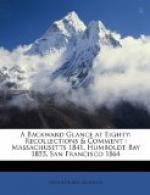“In his sleeves, which were long,
He had twenty-one packs:”
and that was the accepted reading for many years, in spite of the physical impossibility of concealing six hundred and ninety-three cards and one arm in even a Chinaman’s sleeve. The game they played was euchre, where bowers are supreme, and what Harte wrote was “jacks,” not “packs.” Probably the same pious proofreader who was shocked at the “Luck” did not know the game, and, as the rhyme was perfect, let it slip. Later editions corrected the error, though it is still often seen.
Harte gave nearly three years to the Overland. His success had naturally brought him flattering offers, and the temptation to realize on his reputation seems to have been more than he could withstand. The Overland had become a valuable property, eventually passing into control of another publisher. The new owners were unable or unwilling to pay what he thought he must earn, and somewhat reluctantly he resigned the editorship and left the state of his adoption.
Harte, with his family, left San Francisco in February, 1871. They went first to Chicago, where he confidently expected to be editor of a magazine to be called the Lakeside Monthly. He was invited to a dinner given by the projectors of the enterprise, at which a large-sized check was said to have been concealed beneath his plate; but for some unexplained reason he failed to attend the dinner and the magazine was given up. Those who know the facts acquit him of all blame in the matter; but, in any event, his hopes were dashed, and he proceeded to the East disappointed and unsettled.
Soon after arriving at New York he visited Boston, dining with the Saturday Club and visiting Howells, then editor of the Atlantic, at Cambridge. He spent a pleasant week, meeting Lowell, Longfellow, and Emerson. Mrs. Aldrich, in “Crowding Memories,” gives a vivid picture of his charm and high spirits at this meeting of friends and celebrities. The Boston atmosphere as a whole was not altogether delightful. He seemed constrained, but he did a fine stroke of business. James R. Osgood & Co. offered him ten thousand dollars for whatever he might write in a year, and he accepted the handsome retainer. It did not stimulate him to remarkable output. He wrote four stories, including “How Santa Claus Came to Simpson’s Bar,” and five poems, including “Concepcion de Arguello.” The offer was not renewed the following year.
For seven years New York City was generally his winter home. Some of his summers were spent in Newport, and some in New Jersey. In the former he wrote “A Newport Romance” and in the latter “Thankful Blossom.” One summer he spent at Cohasset, where he met Lawrence Barrett and Stuart Robson, writing “Two Men of Sandy Bar,” produced in 1876. “Sue,” his most successful play, was produced in New York and in London in 1896.
To earn money sorely needed he took the distasteful lecture field. His two subjects were “The Argonauts” and “American Humor.” His letters to his wife at this time tell the pathetic tale of a sensitive, troubled soul struggling to earn money to pay debts. He writes with brave humor, but the work was uncongenial and the returns disappointing.




